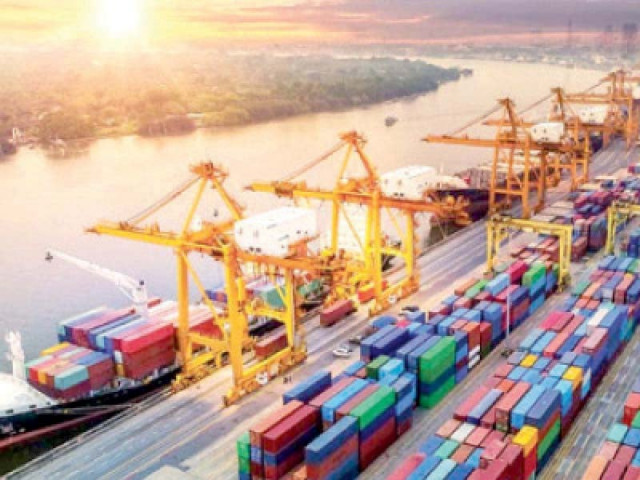Dar’s comeback flips sentiment
Timing of return stands in his favour but challenges remain intact

PML-N’s second most powerful leader, and an experienced former finance minister, Ishaq Dar has returned to Pakistan after five years of self-exile. He was sworn in as Senator a day earlier, and is set to become the next finance minister on Wednesday (today) amid a high crisis in the domestic economy.
The business community has high hopes for Dar to be the next finance minister considering his experience, performance and track record in a similar position in the past. Some, however, remain sceptical given the challenges that stand tall in the economy at this time.
Fortunately, the timing of his return stands in his favour. For one, the world has committed its support in helping Pakistan, overcome the devastation caused by the floods, and have pledged $1.5-2 billion in aid. Secondly, global commodity prices have started easing and are ready to cut the country’s import bill.
While Dar’s return has turned domestic business sentiment positive, weak economic fundamentals remain intact. Pakistan Business Council (PBC) CEO Ehsan Malik said Dar’s return has changed the local sentiment to positive for businesses. “However, it may remain challenging for him to win the same high-level confidence from the world beyond the country’s borders,” he said.
“Mobilising foreign currency inflows from multilateral and bilateral creditors and friendly countries…and building up the country’s foreign exchange reserves will remain one of the biggest challenges for him,” said Malik.
Despite the price of global commodities falling, “The floods have created a scenario where the country has to make additional imports of cotton and wheat worth $3-3.5 billion in the current fiscal year 2023,” he added.
“Pakistan’s foreign debt obligations have continued to spike. And accordingly, Pakistan’s risk of default on foreign debt repayment continues to hover on the higher side. The external world still believes Pakistan will default,” claimed the PBC CEO.
“While Dar is known for keeping the rupee strong and protected against the US dollar, the country does not have foreign exchange reserves to defend the rupee in the inter-bank market. Secondly, given the IMF conditions, this time the central bank is not allowed to control the rupee,” Malik remarked.
Pakistan can no longer afford to keep imports controlled as being done at present. “Half of the industries are either lying closed or facing output cuts. Exporters have started reporting losing orders amid a recession in Europe which remains a key export market for Pakistan,” he added.
“A meaningful boost in export earnings and workers’ remittance…is the only long-lasting solution and way forward for Pakistan to come out of financial crisis once and for all. Exports have to be higher than outflows (import payments),” he said.
Seasoned businessman Arif Habib said, the biggest challenge in Pakistan is having a stable rupee. “Dar is an experienced (former) finance minister. He had a stable rupee in the past and that’s why the rupee has continued to gain ground against the greenback for the past three consecutive working days. Secondly, the significant drop in global commodity prices will also help him reduce import bills and bring down the imported inflation as well.”
“With the country facing historical floods, Dar is a man capable of steering the country out of this economic crisis,” he said.
Business Tycoon Akeel Karim Dhedhi posed confidence in Dar’s leadership as well but felt it was too soon to comment on his future performance.
“Let him work for a week to two. Let him give a couple of policy statements and then we can discuss where he will take the country in the future,” he said.
He did, however, say that the change of ministership had become necessary considering Miftah Ismail’s performance was not up to the mark.
It is, however, learned that the change of finance minister is logical given that Ismail, who took charge as finance minister in April, was set to leave the position in October in any case. Being an unelected minister, he did not have the mandate to serve the country in the position for more than six-month.
The PBC CEO further added that the efforts to reschedule foreign debt worth $10 billion from the Paris club would make no meaningful impact immediately. “The rescheduling will not increase inflows and neither will it boost foreign exchange reserves. We need inflows to deal with the financial crisis at present,” he said.
Talking about the IMF deal, Malik added that “Ismail had developed a good understanding with the IMF team. Renegotiating the IMF loan programme would not be an easy task for Dar.”
Malik warned, however, that Pakistan’s economy would pay a high price if the authorities continued to keep administrative control over imports. “The situation will become even more difficult if unemployment spikes due to the controlling of imports.”
Published in The Express Tribune, September 28th, 2022.
Like Business on Facebook, follow @TribuneBiz on Twitter to stay informed and join in the conversation.



















COMMENTS
Comments are moderated and generally will be posted if they are on-topic and not abusive.
For more information, please see our Comments FAQ